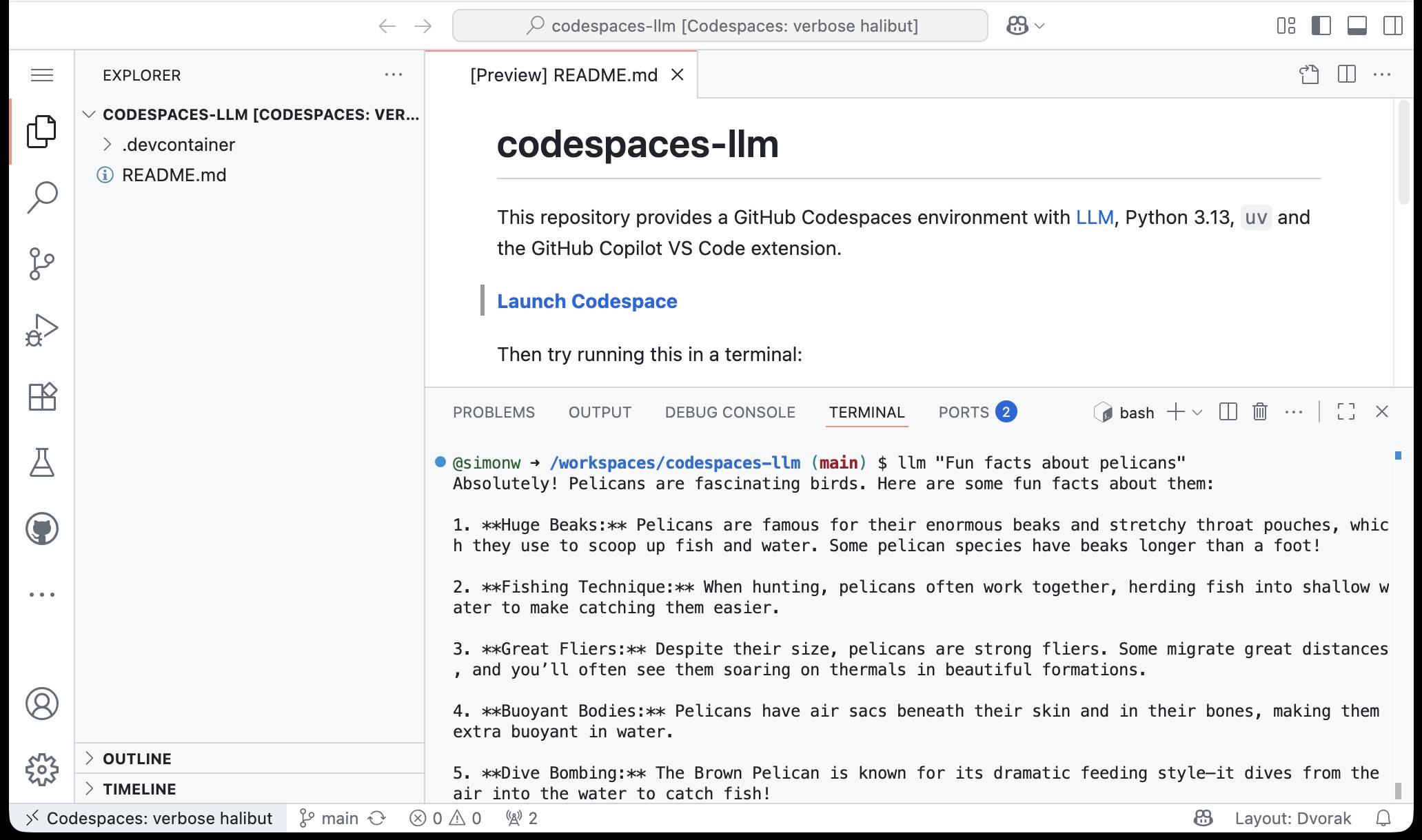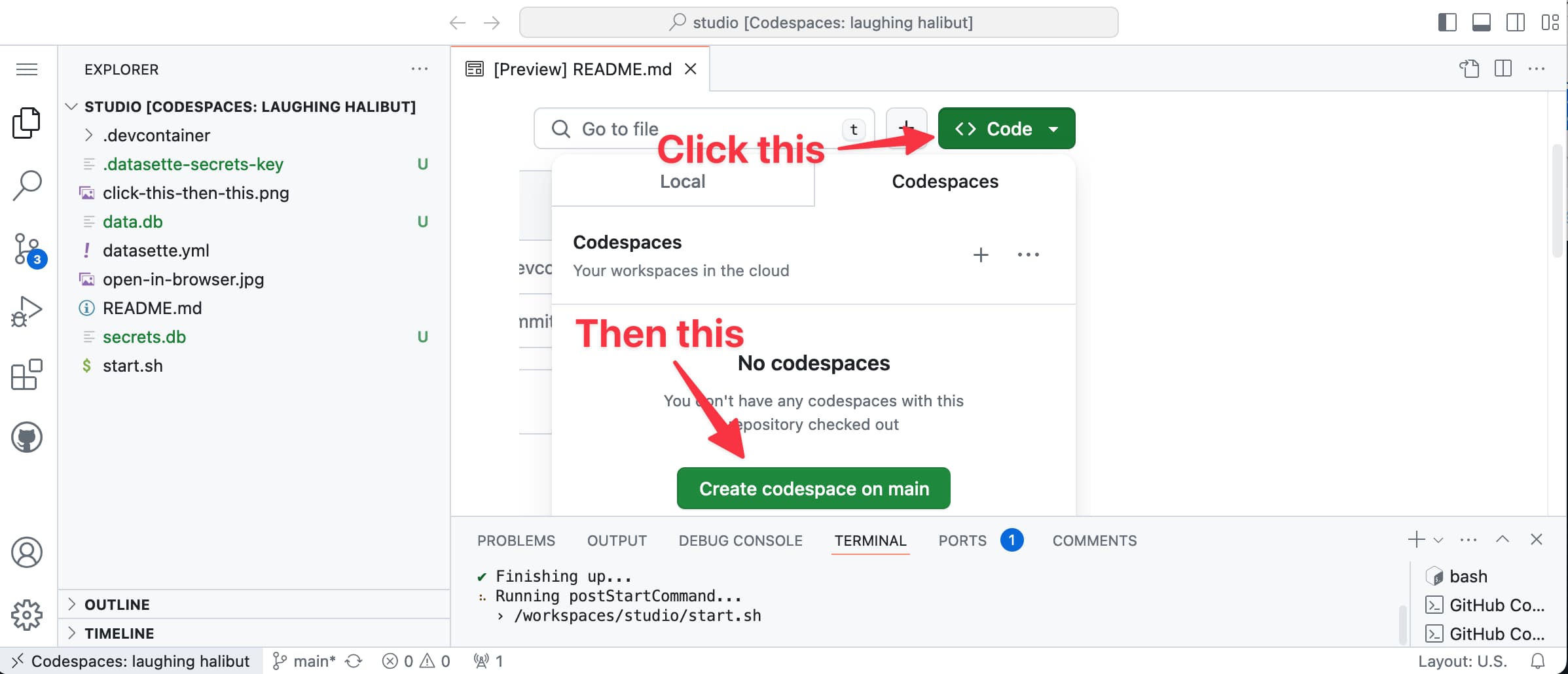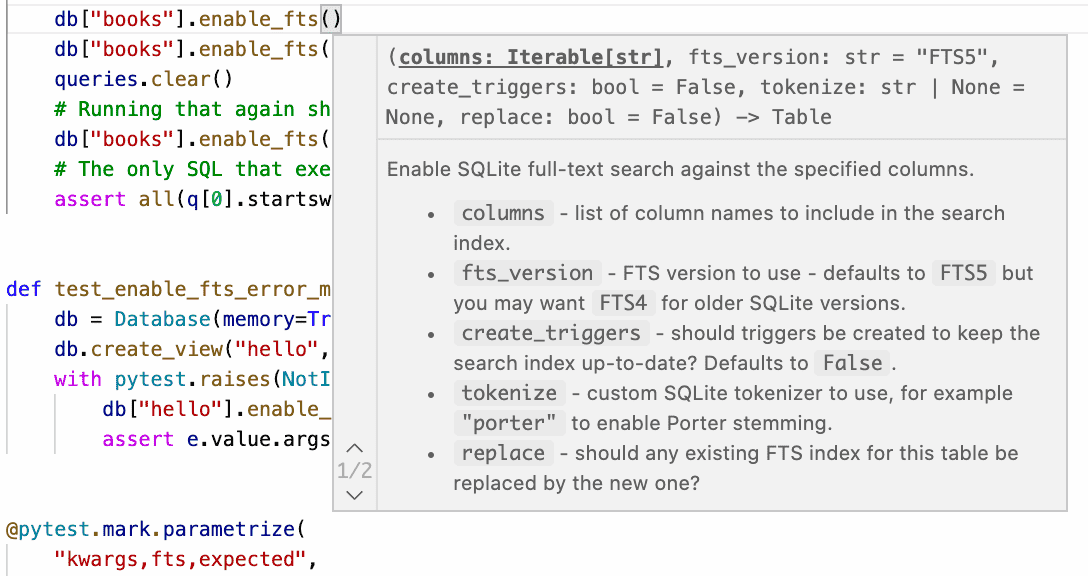11 posts tagged “github-codespaces”
GitHub Codespaces provides cloud development environments accessible through a browser.
2025
simonw/codespaces-llm. GitHub Codespaces provides full development environments in your browser, and is free to use with anyone with a GitHub account. Each environment has a full Linux container and a browser-based UI using VS Code.
I found out today that GitHub Codespaces come with a GITHUB_TOKEN environment variable... and that token works as an API key for accessing LLMs in the GitHub Models collection, which includes dozens of models from OpenAI, Microsoft, Mistral, xAI, DeepSeek, Meta and more.
Anthony Shaw's llm-github-models plugin for my LLM tool allows it to talk directly to GitHub Models. I filed a suggestion that it could pick up that GITHUB_TOKEN variable automatically and Anthony shipped v0.18.0 with that feature a few hours later.
... which means you can now run the following in any Python-enabled Codespaces container and get a working llm command:
pip install llm
llm install llm-github-models
llm models default github/gpt-4.1
llm "Fun facts about pelicans"
Setting the default model to github/gpt-4.1 means you get free (albeit rate-limited) access to that OpenAI model.
To save you from needing to even run that sequence of commands I've created a new GitHub repository, simonw/codespaces-llm, which pre-installs and runs those commands for you.
Anyone with a GitHub account can use this URL to launch a new Codespaces instance with a configured llm terminal command ready to use:
codespaces.new/simonw/codespaces-llm?quickstart=1

While putting this together I wrote up what I've learned about devcontainers so far as a TIL: Configuring GitHub Codespaces using devcontainers.
2024
Weeknotes: Datasette Studio and a whole lot of blogging
I’m still spinning back up after my trip back to the UK, so actual time spent building things has been less than I’d like. I presented an hour long workshop on command-line LLM usage, wrote five full blog entries (since my last weeknotes) and I’ve also been leaning more into short-form link blogging—a lot more prominent on this site now since my homepage redesign last week.
[... 736 words]datasette/studio. I’m trying a new way to make Datasette available for small personal data manipulation projects, using GitHub Codespaces.
This repository is designed to be opened directly in Codespaces—detailed instructions in the README.
When the container starts it installs the datasette-studio family of plugins—including CSV upload, some enrichments and a few other useful feature—then starts the server running and provides a big green button to click to access the server via GitHub’s port forwarding mechanism.
Exploring codespaces as temporary dev containers (via) DJ Adams shows how to use GitHub Codespaces without interacting with their web UI at all: you can run “gh codespace create --repo ...” to create a new instance, then SSH directly into it using “gh codespace ssh --codespace codespacename”.
This turns Codespaces into an extremely convenient way to spin up a scratch on-demand Linux container where you pay for just the time that the machine spends running.
2023
Exploration de données avec Datasette. One of the great delights of open source development is seeing people run workshops on your project, even more so when they’re in a language other than English! Romain Clement presented this French workshop for the Python Grenoble meetup on 25th May 2023, using GitHub Codespaces as the environment. It’s pretty comprehensive, including a 300,000+ row example table which illustrates Datasette plugins such as datasette-cluster-map and datasette-leaflet-geojson.
codespaces-jupyter (via) This is really neat. Click “Use this template” -> “Open in a codespace” and you get a full in-browser VS Code interface where you can open existing notebook files (or create new ones) and start playing with them straight away.
Teaching News Apps with Codespaces (via) Derek Willis used GitHub Codespaces for the latest data journalism class he taught, and it eliminated the painful process of trying to get students on an assortment of Mac, Windows and Chromebook laptops all to a point where they could start working and learning together.
Using Datasette in GitHub Codespaces. A new Datasette tutorial showing how it can be run inside GitHub Codespaces—GitHub’s browser-based development environments—in order to explore and analyze data. I’ve been using Codespaces to run tutorials recently and it’s absolutely fantastic, because it puts every tutorial attendee on a level playing field with respect to their development environments.
2021
Weeknotes: CDC vaccination history fixes, developing in GitHub Codespaces
I spent the last week mostly surrounded by boxes: we’re completing our move to the new place and life is mostly unpacking now. I did find some time to fix some issues with my CDC vaccination history Datasette instance though.
[... 514 words]Datasette on Codespaces, sqlite-utils API reference documentation and other weeknotes
This week I broke my streak of not sending out the Datasette newsletter, figured out how to use Sphinx for Python class documentation, worked out how to run Datasette on GitHub Codespaces, implemented Datasette column metadata and got tantalizingly close to a solution for an elusive Datasette feature.
[... 2,164 words]GitHub’s Engineering Team has moved to Codespaces. My absolute dream development environment is one where I can spin up a new, working development environment in seconds—to try something new on a branch, or because I broke something and don’t want to spend time figuring out how to fix it. This article from GitHub explains how they got there: from a half-day setup to a 45 minute bootstrap in a codespace, then to five minutes through shallow cloning and a nightly pre-built Docker image and finally to 10 seconds be setting up “pools of codespaces, fully cloned and bootstrapped, waiting to be connected with a developer who wants to get to work”.

